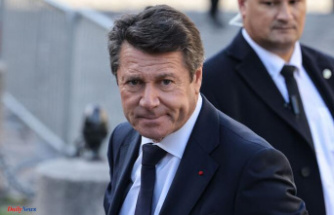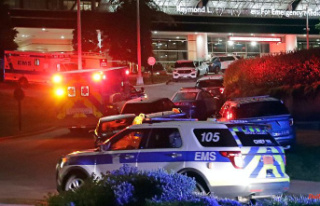Russia is attacking Ukrainian cities with rockets, deliberately targeting civilian infrastructure. In the process, other problems of the Russian army have recently become clear, says NATO Lieutenant General a. D. Ben Hodges in the ZDF program Maybrit Illner.
"Russia's President Vladimir Putin continues to escalate." This is how political scientist Margarete Klein assesses the Russian rocket attacks on Ukrainian cities that began on Monday. Russia specifically targeted residential buildings and civilian infrastructure. This could mean that the attacks were war crimes. Putin is under a lot of pressure in Russia, Klein explains on the ZDF program Maybrit Illner, in which politicians and security experts are once again arguing about the current situation in Ukraine.
Putin's regime is very much identified with foreign policy greatness and foreign policy successes. "The economic pillar with the distribution of benefits for the Russian population has long since disappeared," Klein continued. Putin must continue to demonstrate his foreign policy greatness. That's why he's trying to weaken the humanitarian situation in Ukraine, why the Russian partial mobilization and the proclaimed recognition of the four regions in Ukraine that Russia hasn't even fully conquered. "Then the nuclear threat comes on top, which is intended to deter Ukraine from further reconquest of the territories and the West from further aid to Ukraine."
For NATO Lieutenant General a. D. Ben Hodges The Russian attacks revealed other problems of the Russian army. You ran out of precision weapons, which could not be replaced because of western sanctions, he says at Illner. In addition, the Black Sea Fleet is hiding. Putin's aim is to prolong the war so that the West will lose patience and reduce support for Ukraine.
But it doesn't look like it at the moment. Germany has now handed over the IRIS-T SLM air defense system to Ukraine. According to the federal government, it is the most modern air defense system in Germany and it offers protection against attacks by aircraft, helicopters, cruise missiles and short-range ballistic missiles. It is designed to protect entire cities from Russian attacks. Even the Bundeswehr does not yet have this system. "IRIS-T saves people," summarizes Green Party leader Omid Nouripour's achievement.
But it doesn't seem to be that easy after all. Terrorism and security expert Peter R. Neumann qualifies: Germany has delivered an air defense system, but only 48 missiles. He says: "If Russia attacks a city, then this system can protect, but only for half a day." Germany has promised Ukraine ten IRIS-T systems, Nouripour replies. "Now it is crucial to look at what Ukraine needs and what is feasible," said the Green politician.
Former NATO Lieutenant General Hodges agrees. "The Ukrainians are doing everything to win the war," he says. Putin has now also recognized the strength of the Ukrainian army, while the Russian side lacks the will to fight. Hodges can imagine that by the summer the Ukrainian army had pushed Russian forces back to pre-war positions. He doesn't even rule out the possibility of recapturing Crimea. This winter is also the last in which Putin can still blackmail the West with energy supplies to Europe. Putin gambled too high. "He pulled his gas ace out of his sleeve too early," said the three-star general.
Expert Peter R. Neumann also thinks it is important for Ukraine to regain as much territorial integrity as possible. However, he complains that it has not yet been defined what a victory for Ukraine could look like. Nouripour answers the question: "Winning for the Ukrainians means getting their country back." But Neumann does not agree with that. "If a victory for Ukraine means that we have chaos in Russia, a state collapse, or someone coming to power who is even more nationalistic, that is not necessarily a positive outcome geopolitically because it can create even bigger problems."
It is currently particularly important to prevent attacks like those on the Nord Stream pipelines or on the railway last weekend, Nouripour demands at the end of the program. That is why the Greens leader is calling for the police to monitor the critical infrastructure in Germany more closely. "For that you need a corresponding law. And that has to happen very quickly, because we've seen that the impacts and the attacks are getting closer and closer." According to Nouripour, the traffic light coalition has already agreed on such a law.












